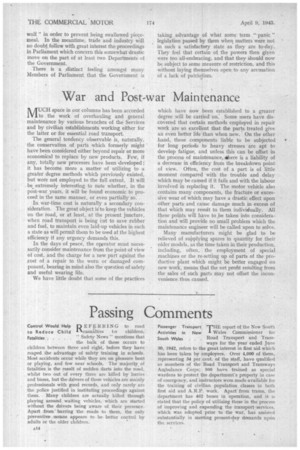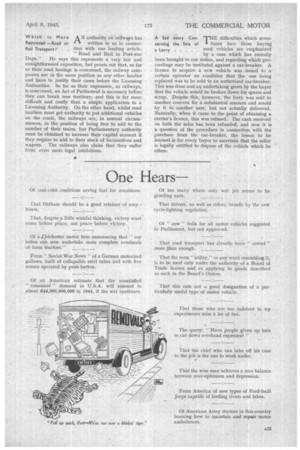Passing Comments
Page 16

Page 17

If you've noticed an error in this article please click here to report it so we can fix it.
REFERR1NG to road casui4lties to children, "Safety News" mentions that the bulk of these occurs to children between three and eight, before they have reaped the advantage of safety training in schools. Most accidents occur while they are on pleasure bent or playing, and few near schools. The majority. of fatalities is the result of sudden darts into the road, whilst two out of every three are killed by lorries and buses, but the drivers of these vehicles are mainly professionals with good records, and only rarely are the police justified in instituting proceedings against them. Many children are actually killed through playing around waiting vehicles, which are started without the drivers being aware of their presence. Apart from barring 'the roads to them, the only preventive means appears to be better control by adults or the older children.
Control Would Help to Reduce Child Fatalities
THE report of the New Smith Wales Commissioner for Road Transport and Tramways for the year ended June 30, 1942, refers to the great interest in first aid which has been taken by employees. Over 4,000 of them, representing 34 per cent. of the staff, have qualified as members of the Road Transport and Tramways Ambulance Corps; 506 have trained as special wardens to protect the department's property in case of emergency, and instructors were made available for the training of civilian population classes in both first aid and A.R.P. work. Apart from trams, the department has 462 buses in operation, and itis stated that the policy of utilizing these in the-process of improving and expanding the transport services, which was adopted prior to the war, has assisted substantially in meeting present-day demands upon the services.
Passenger Transport Activities in New South Wales . . .
Which is More AN authority on railways has Restricted — Road or written to us in connecRail Transport ? . . tion with our leading article,
"Road and Rail in Post-war Days." He says this represents a very fair and straightforward exposition, but points out that, so far as their road haulage is concerned, the railway companies are in the same position as any other haulier and have to justify their cases before the Licensing Authorities. So far as their expansion, as railways, is concerned, an Act of Parliament is necessary before" they can break new territory, and this is far more difficult and costly than a simple application to a Licensing Authority. On the other hand, whilst road hauliers must get authority to put additional vehicles on the roads, the railways are, in normal circumstances, in the position of being free to add to the number of their trains, but Parliamentary authority must be obtained to increase thejr capital account if they require to add to their stock of locomotives and wagons. The railways also claim that they suffer from even more legal inhibitions.
A Sad story ConTHE difficulties which somecernina the Sale of 1 times face those buying
a Lorry used vehicles are emphasized by a case which has recently been brought to our notice, and regarding which proceedings may be instituted against a car-breaker. A licence to acquire a new vehicle was issued to a certain operator on condition that the one being replaced was to be sold to an authorized car-breaker. This was done and an undertaking given by the buyer that the vehicle would be broken down for spares and scrap. Despite this, however, the lorry was sold .to another concern for a substantial amount and resold by it to another user, but not actually delivered. Naturally, when it came to the point of obtaining a carrier's licence, this was refused. The cash received on both the sales has been refunded, and now it is a question of the procedure in connection with the purchase from the car-breaker, the lesson to be learned is for every buyer to ascertain that the seller is legally entitled to dispose of the vehicle which he offers.




















































